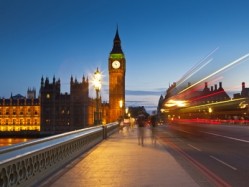Treasury rejects VAT cut despite cross-party support

Opening the debate, MP for South Downs Margaret Ritchie pointed out that the UK’s tourism industry - which provides 10 per cent of GDP and supports more than two million jobs – had been hit ‘particularly hard’ by the higher rate of VAT introduced by the government.
Pointing out that other EU member states had introduced sector-specific cuts for the tourism industry, she said the UK hospitality industry faced “one of the worst policy regimes possible”.
She said the UK had been placed 138th out of 140 countries for price competitiveness for tourism by the World Economic Forum, and she accused the government of “lethargy when it comes to supporting the tourism industry.”
Ritchie asked the minister to consider reducing VAT on hotel accommodation and visitor attractions from 20 per cent to 5 per cent and consider broadening that out in the future to the wider hospitality sector, including to food served in pubs and restaurants.
“That would encourage many more foreign visitors and provide an incentive for staycations in the domestic market. It would boost coastal resorts, rural retreats and cities and towns that have been hit hard by the economic downturn since 2008,” she said.
Cross-party support
The proposal attracted support from MPs across the different parties, who recognised the positive impact it would have on hospitality businesses in their constituencies, as well as employment and the wider economy.
Green MP and co-signatory to the debate, Caroline Lucas, described the VAT cut as a 'win-win-win' measure.
“It is good for jobs and for the economy, because over time it is likely to raise revenue for the Exchequer, and it addresses the competitive disadvantage that the UK suffers by comparison with other parts of the European Union,” she said.
She highlighted the fact that 44 per cent of those employed in hospitality are under the age of 30, and said a cut in VAT tourism would encourage the creation of employment opportunities for young people, which was 'incredibly important'.
Liberal Democrat MP Alan Reid pointed out that the Isle of Man cut VAT on tourism to 5 per cent 20 years ago, and the policy had been a huge success.
“Visitor numbers to the Isle of Man show that, in the nine years before the cut, there was a sharp decline in tourism, but after the VAT cut, visitor numbers recovered strongly and have stayed high since then,” he said.
Conservative MP Nick de Bois said the UK’s VAT position put the UK at a 'competitive disadvantage' for attracting business tourism and international events.
“Whether the industry thrives or survives is not just down to VAT, but VAT influences decisions on where to hold events,” he said.
No plans for VAT cut
However, Exchequer Secretary to the Treasury Gauke said the government had 'no plans' to introduce a VAT cut for the sector.
Gauke stressed that the government appreciated the ‘value and importance’ of the tourism sector, but claimed it was yet to find ‘any evidence of a casual link between VAT rates and tourism activity’.
He claimed Office for National Statistics (ONS) data suggested that cutting VAT for food in restaurants, pubs and cafes would cost the Exchequer between £9bn and £10bn a year, while cutting VAT to 5 per cent for accommodation would cost a further £2bn.
Gauke pointed out that these costs would have to be met by increasing other taxes or increasing borrowing, which is contrary to the government's economic plan.
“A cut in VAT would be expensive and would create a revenue shortfall,” he said. “That would put the Government’s economic credibility and long-term economic plan at risk.”
Shadow Exchequer Secretary Shabana Mahmood MP also refused to commit to a VAT cut, pointing out that an incoming Labour government would “inherit a difficult financial situation” and would need to make sure that “the sums add up” before cutting any taxes.
Industry reaction
Speaking after the debate, Graham Wason, chairman of the Cut Tourism VAT campaign said: “We are delighted at the all-party support shown for reduction in this first debate on Tourism VAT in parliament. It was a fantastic turnout of 28 MPs.
“All except the Minister responding were convinced of the need for a cut on VAT for visitor accommodation and attractions and many references were made to evidence, using a Treasury approved financial modelling system, the positive impact for the UK economy this would have.”
Intercontinental Hotels Group’s chief operating officer UK & Ireland, Stephen McCall said the VAT rate on visitor accommodation was undermining the hospitality sector’s ability to compete.
"A cut in the rate of VAT will encourage more UK residents to take short breaks here and encourage more foreign travellers to visit the UK,” he said.
“Tourism has created a third of all new private sector jobs since 2009 in spite of the VAT rate. We'd like to be able to fulfil our potential. “














